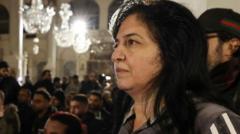Protests have erupted in Syria, particularly in the central town of Suqaylabiyah near Hama, after masked gunmen set fire to a Christmas tree displayed in the main square. The incident sparked outrage among local Christians, leading to thousands pouring into the streets to demand the protection of their religious and ethnic communities. A video circulating on social media displayed the shocking act, prompting a swift response from the main Islamist faction, which claimed the assailants were foreign fighters and vowed the tree would be repaired.
In the Bab Touma district of Damascus, protesters held crosses alongside Syrian flags, chanting, "we will sacrifice our souls for our cross." A local demonstrator named Georges voiced the sentiments of many, stating, "If we're not allowed to live our Christian faith in our country, as we used to, then we don't belong here anymore."
Syria's diverse population consists of various ethnic and religious groups, including Kurds, Armenians, Assyrians, Christians, and Muslims. The recent events come just over two weeks after rebel forces ended President Bashar al-Assad’s over-50-year rule.
The future governance of Syria under the Hayat Tahrir al-Sham (HTS) group, which has sought to distance itself from its jihadist roots, remains uncertain. HTS leaders have expressed intentions to build an inclusive Syria, promising protection for minorities’ rights. However, the group is still labeled a terrorist organization by multiple international entities.
Recent developments include the US lifting a $10 million bounty on HTS leader Ahmed al-Sharaa, indicating potential diplomatic shifts. Meanwhile, the US continues its military operations, targeting ISIS operatives in Syria. The presence of foreign fighters, Islamic extremists, and those rooting for instability poses significant challenges for the incoming Islamic leadership in safeguarding the country's religious minorities.




















